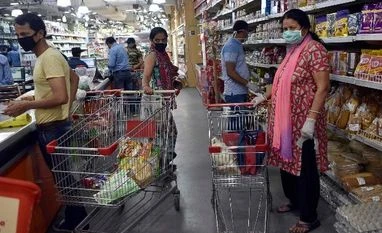If there is one sector that has been swift to adapt to change, it is e-commerce and retail. “The interface with customers is high in retail. Retailers and e-tailers have been left with no choice but to introduce changes quickly to survive,” said Arvind Singhal, chairman, Technopak.
Running essential services, no matter how constrained during the lockdown, has helped retail and e-commerce majors prepare themselves for the road ahead. They are accustomed to deep cleaning and sanitization of hubs, shop floors, high-contact points, and cash counters.
Thermal screening of staff and customers happens at all entry and exit points of stores and fulfilment centres. Employee hours are staggered. Shoppers have fixed time slots, and delivery boys and shop floor executives are getting digital training.
Amazon has made around 100 small to large changes ranging from using personal protective equipment, doing regular temperature checks, and changing the way items are picked, packed and bagged to ensure a minimum two-metre distance. Only one person is allowed to load or unload products at any given time. The arrival of drivers and delivery associates has been staggered to avoid crowding.
At Flipkart’s fulfilment centres and hubs, hand hygiene, temperature checks. and personal protective equipment have also become the norm. Hub employees, security personnel, and Flipkart delivery executives have to ensure their centres are thoroughly cleaned before heading out to deliver essentials. Innovative tie-ups with Meru and Uber for last-mile delivery have been started.
But these new challenges are a picnic compared with what lies ahead for offline retailers. Grocery retailers are doing more home deliveries and going to large housing complexes to fulfil people’s needs. Non-essential retailers such as Bata, Puma and Tanishq, for example, are capping the number of visitors allowed inside their stores and encouraging consumers to browse their catalogues online.
Retailers of non-essential goods have opened shops in green and orange zones for now in some states. With lockdown 4.0 kicking in from Monday, further relaxations are expected, including stores reopening in red zones.
Pinakiranjan Mishra, partner and national leader, consumer products and retail, EY India, said retailers will need to re-evaluate their store portfolios and invest in service, experience, and omni-channels to serve new consumers and look at new payment methods.
The Future Group has pushed the rollout of its Easyday online delivery operations across eight cities (covering 250 Easyday stores) during the lockdown so that it can reach consumers easily, as it were.
Consumers can shop online using the Easyday app which will work as a hyperlocal delivery platform. The group has tied up with third-party platforms such as Dunzo for last-mile delivery.
DMart has started a token system to monitor crowds and ensure that shopping is smooth. Customers are given a specific time slot for shopping for 15 minutes and asked to be there at the appointed time. Temperature checks of customers and employees is undertaken before entry and hand sanitizers and masks are provided to all.
Metro Cash & Carry Managing Director and Chief Executive Officer Arvind Mediratta said it is pre-packing loose commodities to avoid infection at its stores and providing plenty of cash tills and mobile checkouts to reduce the billing time. It has also introduced a token system to avoid crowding. “The tokens are properly sanitised and only then handed over to customers,” said Mediratta.
Walmart India, which operates the Best Price Cash & Carry format, has also marked lines and is only permitting one person per membership card. Floors at Best Price stores are marked with yellow stripes and boxes to ensure enough space for each member when shopping or standing in queues. They are also equipped with contactless thermometers.
Bata has created an instruction manual in 11 regional languages for its 6,000-odd employees, trained store staff, and done away with paper bills to avoid infection. The retailer is asking customers to try shoes on themselves, with no help from shop assistants, and make digital payments to minimise the risk of infection.
Retailers say these new safety protocols and operating proce-dures will become a part of life. FY21 is expected to be a challenging year, with costs shooting up and revenue under pressure. Consumers too will reduce the frequency of visits to stores, shop online to avoid long queues, and prefer home deliveries.
et
To read the full story, Subscribe Now at just Rs 249 a month
Already a subscriber? Log in
Subscribe To BS Premium
₹249
Renews automatically
₹1699₹1999
Opt for auto renewal and save Rs. 300 Renews automatically
₹1999
What you get on BS Premium?
-
Unlock 30+ premium stories daily hand-picked by our editors, across devices on browser and app.
-
Pick your 5 favourite companies, get a daily email with all news updates on them.
Full access to our intuitive epaper - clip, save, share articles from any device; newspaper archives from 2006.
Preferential invites to Business Standard events.
Curated newsletters on markets, personal finance, policy & politics, start-ups, technology, and more.
Need More Information - write to us at assist@bsmail.in
)